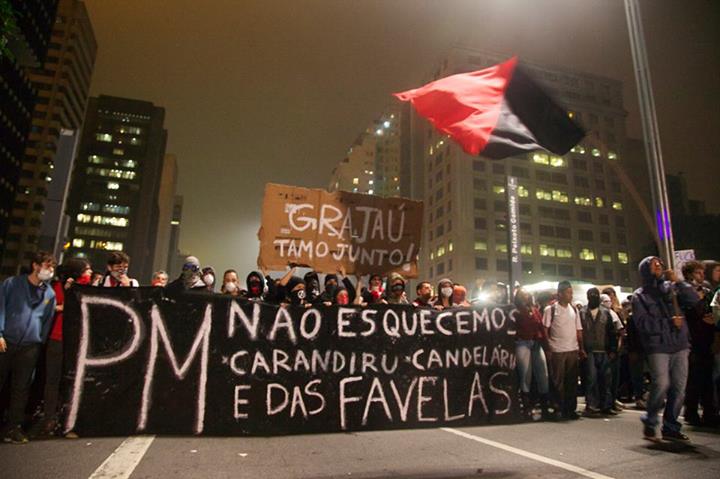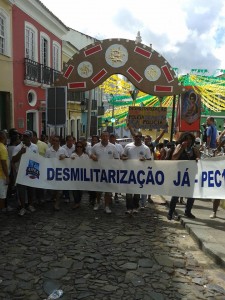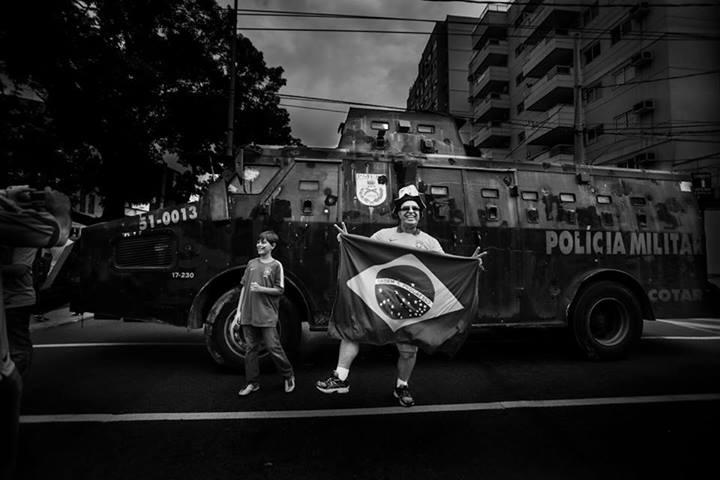This post is part of our special coverage Vinegar Revolt [1]
[All links lead to Portuguese-language pages unless otherwise noted.]
The merits of having a militarized police force is under scrutiny in Brazil in response to accusations of blatant police violence against journalists and civilians during protests last month's massive protests throughout the country.
The debate on the demilitarization of the military police in the country is not new. Part of the legacy of Brazil's dictatorship from 1964 to 1985, the military police emerged as a solution through the extinction of the Public Force and Civil Guard. After the 1964 coup, the new government abandoned the idea of creating a single, civilian police and implemented a military model.
Today, almost all urban policing in Brazil is done by military police attached to the governments of each state, and the country remains the only one in the world to have a police force that operates out of the military barracks [2].
The recent protests have resurrected the question for debate. On July 1, 2013, during public class [4] organized in the hall of Museum of Art of São Paulo (MASP) by the group Occupy Sampa, guest lecturer Tulio Vianna, a professor of Criminal Law at the Federal University of Minas Gerais (UFMG), argued that the design of military training is what triggers excessively violent actions by police. For Vianna [5]:
A polícia não pode ser concebida para aniquilar o inimigo. O cidadão que está andando na rua, que está se manifestando, ou mesmo o cidadão que eventualmente está cometendo um crime, não é um inimigo. É um cidadão que tem direitos e esses direitos tem de ser respeitados.
Comparing the Brazilian case with other police forces of the world, the professor also noted:
Quando a sociedade opta por uma polícia militar, o que essa sociedade quer é uma polícia que cumpra ordens sem refletir. É claro que quando se dá um treinamento onde o próprio policial é violentado, como vou exigir que esse indivíduo não violente os direitos de um suspeito?
 [6]
[6]A line in the protest at Paulista Avenue on June 10 commemorates the Carandiru massacre in São Paulo, and Candelaria in Rio de Janeiro. Both incidents were orchestrated by command of the military police of each state. Photo: Caio Castor via Facebook (used with permission).
A history of violence
The “Revolt of the Ratchet [7],” which took place in Santa Catarina in 2005, was the first major demonstration linked to the issue of public transport [8] in the country to have an impact. The episode also ended with reports of protesters injured and arrested in the midst of a peaceful protest, as shown in this video posted by Vinicius (Moscão) [9]:
Though homicides and violent acts committed by military police agents in the suburbs, “where the bullets are not rubber [10]“, do not draw media attention every day, they show some of the problems of police militarization reported by Brazil Global Justice organization in a June 24, 2013 note [11].
Among the episodes of military police violence reported by Global Voices are the repossession of the rectory [12] of the University of São Paulo in 2011, after students protested against the increase in the actual effect of military police on campus; vacating the Pinheirinho settlement [13] [en] in the city of São José dos Campos in São Paulo, with more than 6,000 people displaced [14] from their homes; and clashes with demonstrators protesting against the privatization of public space [15] [en] due to World Cup preparation in Porto Alegre.
Against the system
While revealing the violent face of the military police, the recent protests also showed that within the military police there are soldiers who disagree with the system [16].
During the first days of protest in São Paulo in June 2013, a soldier replaced the pepper spray he had with water, disagreeing with orders to attack the demonstrators. Using social networks to justify his action in a post with more than 3,000 shares [17], deleted shortly after, Ronaldo Silva said:
O spray de pimenta é uma agressão violenta utilizada sem necessidade na maioria das situações e a corporação não pode fechar os olhos para isso. Além do mais, os protestos são pacíficos e totalmente legítimos
Internationally, groups such as Amnesty International [18], the UN Human Rights Council [19] and the US Department of State [20] have spoken out, requesting that Brazil ends the death squads where police officers are believed to be involved – “engaged in social cleansing, extortion, as well as in trafficking in arms and drugs”, as Amnesty International reported [21] in 2012 [en] – and go forward with the process of complete police demilitarization.
The importance of the cause has also grown within Brazil's police companies [22]. Among the 40 approved guidelines within the First National Conference on Public Security [23] [pdf], held in Brasilia in 2009, two pointed to the need for demilitarization. In a survey [24]released by the National Secretariat of Public Security, of the 64,000 security officers interviewed, 40,000 supported the cause. Among the military officers, membership was even higher at 77 percent [25].
 [26]
[26]Photo of protesters carrying the flag of the PEC 102 in Maranhão on July 3, 2013. Photo: Blog do Caxorrao via Facebook [26]
#PEC102
The country's senate is considering a constitutional amendment that would authorizes states to demilitarize and unify their military police. By senator Blairo Maggi, the PEC 102 [27] was one of the issues under debate on the strikes by military police and firefighters [28] across the country in early 2012. The proposal would give police strike and union rights [29], which are now banned by the constitution, since they are subject to military code of conduct and discipline.
On Twitter, users defended the proposal under the hashtag # PEC102 [30]. @willcjc [31] wrote:
Desmilitarizar e Unificar as polícias é fulminar as estruturas repressoras de uma entidade adestrada pela ditadura. Sim à #PEC102 [32]!
— WILL ⓟ (@willcjc) June 28, 2013 [33]
The proposal, however, is not supported unanimously. For the National Association of Prosecutors of the Republic [34] [PDF] it is “unconstitutional”. Contesting in a statement the creation of the National Security Council, included in the PEC, the association says:
(..) a Polícia não tem autonomia funcional, não se amoldando, portanto, à forma de controle por meio de Conselho. Supor a criação de uma polícia independente atenta contra o princípio da separação de poderes.
Anyway, the debate has already started. As Antônio Carlos stated, executive director of the Group for the Defense of Human Rights Rio de Paz [35], told the Jornal do Brasil: [36]
Estamos vivendo um momento histórico e é hora de aproveitá-lo para lutar. O país precisa dessa mudança, mas, devido a um espírito corporativista, não há avanços significativos.
